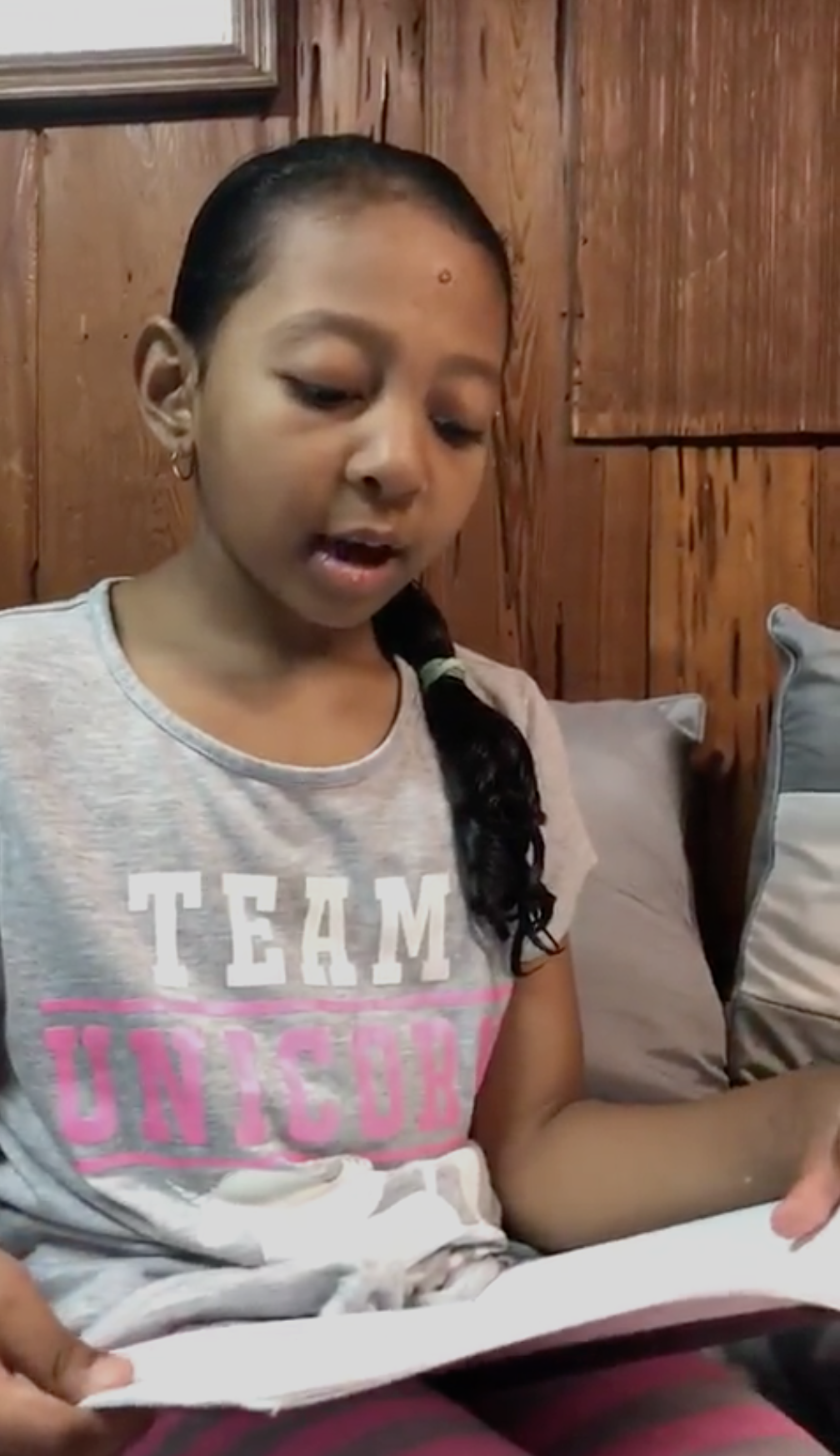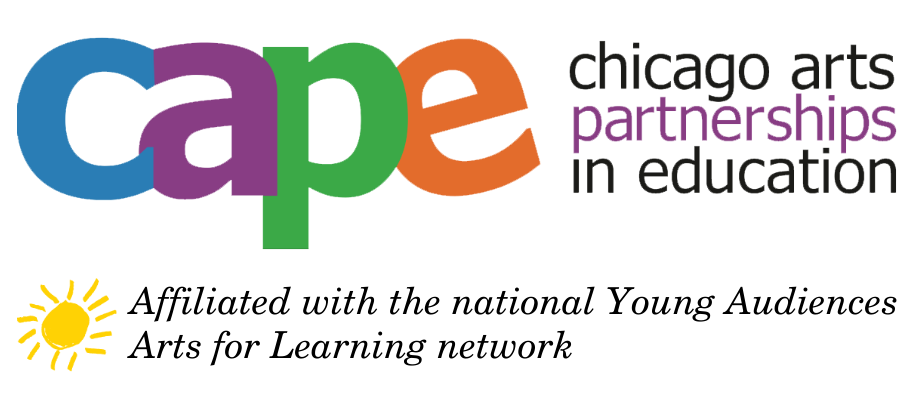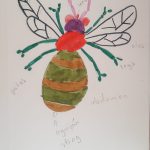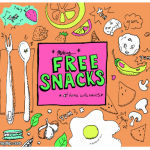“If the Coronavirus Was A Person I Would Beat It Up” Or, Meditations on the Loss of Co-Presence in Learning
The following is a beautiful essay by Sonja Moser, a CAPE teaching artist and professional theatre artist. In writing, Sonia reflects on her CAPE After School classroom at Waters Elementary; the challenges and possibilities of teaching and learning during the pandemic; the impacts of a lack of physicality; and the adaptations required to co-create artistic work with students, maintain relationships, and attend to one’s own mental health in this trying context. This essay was originally published on CAPE’s Network Forum Tumblr.
We are fond of celebrating our adaptability as a species. The quick pivot to virtual learning during this pandemic has been touted with pride by many, and not without good reason. Back in April, I was overjoyed to be reconnected with my students after such a long and unexpected absence. But now that we’re five months into distance learning, and poised to potentially embark on another entire year of the same, other thoughts and feelings have surfaced.
As an artist who’s spent my entire life working in the medium of live theatre, I find the mediated experience of google meets a particular challenge. I will never forget my mentor Robert Woodruff turning to me after a particular scene showing in graduate school and throwing out the question: What feeling are you trying to create in the room? It was the single most impactful question I received as a graduate student in directing, and I’m always mindful of it, not only in the experiences I create for an audience, but like most teachers, in the classrooms in which I’m teaching. There’s what we’re doing, and then there’s the energy with which we’re doing it, and the energy we create as we do it. As I’ve gone through life, I’ve come to feel more and more that the later two are the more important.
At a moment, then, when shared, three dimensional space has collapsed and there is no “room,” I have felt cut off from my purpose, a purpose strictly tied to the empirical senses and to what I’ll call the sixth sense, where you perceive something energetically beyond what is tangibly evident (like when I come home late, open my car door and stop dead in my tracks because my body knows something is wrong. I look around and spot a skunk poised to defend itself two feet away. I stay in the car, close the door, it goes away, and I safely enter the house without needing to go bathe in tomato juice). Like someone suddenly gone blind, I have been struggling to compensate for a lost – or many lost – sense(s). Gone is touch, peripheral vision, smell and taste (irrelevant as they are not shared), and my “sixth” sense. Seeing and hearing as they relate to the only communally available experience (the screen) are on overdrive. I have found it exhausting to try to gather – and transmit – the same amount and kind of information as I used to with my now limited resources.
This doesn’t mean that I can’t affect the feeling of the zoom (rhyme intended), but it’s a lot harder, and the effect is more limited. Even if the technology is working flawlessly, I have a very limited ability to access the intangible feeling in the room in which the children are individually situated, adding an extra barrier to my ability to transform it. If Dad is cooking in the kitchen three steps away or brother is watching tv over on the couch, these can be obstacles for a child’s attention (not to mention my own, as I hear the banging of pots and pans, unrelated music and conversation). Children lie on their beds, wander off for a snack, disappear altogether for sizable chunks of time. Without the room uniting us, without the substantive and sizable impact of group focus, interest, curiosity, enthusiasm that magnifies each individual’s experience exponentially, creating the tide that raises all ships, how do we go after things that are individually challenging or difficult? What prompts a child to move out of their comfort zone, into a place of discovery? What does this mean, I have been asking myself, for personal growth, for learning, for society??
An experience in class last week started to answer these questions for me, addressing the gulf I perceived regarding my ability to actualize what I have put at the center of my own teaching mission – creating connection and tending to the quality of energy between people – and reshaping my general expectations of teaching and learning in this moment.
John Doe is a wonderful rising fifth grader, smart with lots of personality – a “character” – that we are more than happy to have in our drama class. From the first day he had a tendency to regularly pop out of, then rejoin, class. Based on this behavior, my teacher reached out to a former class teacher of John’s and confirmed what she suspected, that he had a learning disability. We proceeded with that understanding, continuing to embrace and celebrate his presence. In the third week of class, our work took a heavily writing-based turn, and John disappeared from class altogether. After two full days of absence, my teacher and I decided to reach out to the parent and share how much we missed John as well as vaguely offer to accommodate him in whatever way would prove useful. We never heard back from the parent, but John returned. The whole class was happy to have him back (they’d been asking after his whereabouts) and when we sensed any tension from him about engaging in certain activities (journal writing, reading aloud etc), we allowed him to opt out. On the second day of his return, while the teacher was reading a story, John went to his bed, laid down and pretended to fall asleep. After receiving no attention, John then verbally announced his intention to go to sleep, at which point the teacher spoke, surprising me. “You go ahead and take your nap. It’s nice to rest your eyes when someone is reading to you. We’ll let you know when it’s time for your nap to be over.” After this, John stopped trying to make his napping obvious (loud snoring, etc.) and we continued uninterrupted in our reading. When the book was done and it was time to “get up,” he did.
After class during our planning period, I complimented my colleague on meeting John so kindly and gently where he was at. She expressed how important it was to her to have him hear the story, to remain with us and not to blip out as he’d done before on so many other occasions. As I digested this information – how she had abandoned redirection and given him permission to conduct himself in ways that would not necessarily have been tolerated in a live classroom – I realized that a completely different set of teacher-student expectations were emerging. You couldn’t teach the child at all if they weren’t on the call, so keeping the child there, connected to you and the group regardless of participation level or behavior, was the goal.
The next day, after we had done group sharing, warmed-up and played some improv games, it was time to move on to project work. I asked one of the students to try an experiment with the piece she was working on. After staring at me a minute, the student slowly but surely started inching her screen in a different direction, so that she could no longer be seen. A very eloquent expression of her shyness, yes, but also – unintentionally – a kind of threat: If you ask me to do something that makes me uncomfortable, I’ll leave. If something like this had happened in a live classroom, I would have changed the temperature in the room, become silly and created an even more loose and forgiving space. Other students might have chimed in and egged her on, taking stabs at the task themselves or offering their own interpretations, resulting in her giving it a try. But with each of us in our own separate spaces, individual pieces of kindling spread throughout disparate fireplaces, the flame couldn’t catch hold and there was no change of heart. What could we do? We moved on. Another student was asked whether they’d completed a suggested overnight experiment; the answer was a soft and sheepish “no.” John showed up without his notebook altogether.
My point is not that these events were a negative outcome from John’s behavior in bed the day before; no, students had shirked “discomfort” here and there all along. What I realized now very consciously, however, was that, more and more, our response was becoming, “it’s okay.” Our teaching had essentially evolved into the practice of protecting the fragile ecosystem of our collective. Fragile not because the children (or we) found the class a chore – no! We could sit and chit-chat and do show and tell all day long! We all genuinely enjoyed being together. Rather, the fragility was based in the now more limited space available for learning – which I’ll define as the activity of stretching one’s mind, body, spirit, will or interest, into new or unfamiliar territory potentially beyond one’s comfort zone – ostensibly the thing we were all gathered together to do. Had willingness to venture beyond the known or familiar shrunk in proportion to our current physical willingness to roam? Is it only our bodies that are sheltering in place?
Let’s face it, times are stressful. Whatever degree of fear or anxiety we experience individually with regard to the virus, the response to contain it has had myriad consequences that have impacted everyone, including fundamentally interfering with our most basic needs and routines. When the course of life has been so dramatically interrupted, how can we expect “learning” to proceed “as usual?” What is becoming clear to me – what the children seem to be showing us – is that learning will no longer – can no longer – happen on what I will call previous “teacher’s terms.” The balance of power has shifted, command of the dynamic is equally distributed amongst the uniformly-sized squares of the screen, each cocooned in the relative comfort of their own distinct world. In these times, for virtual learning, the reality is that connection for it’s own sake may potentially be both the most urgent achievement, and the lowest common denominator.
A few weeks ago I learned that, far from proceeding with “business as usual,” Barnard College was in effect making the “Big Problems” laid bare by this moment in history the center of its entire curriculum for the upcoming fall. I know that many CAPE artists shifted projects in the spring not only to adapt to altered circumstances, like access to materials, but also to address our changing, unfolding landscape. As a team working with a young cohort of 2nd-4th graders, continuity seemed like the most significant thing we could provide and we held onto our project as planned as we went virtual. After several weeks, however, I was left unsatisfied by our ability to engage students with the events we were living through. Consequently, we chose to foreground the matter in our summer program, where we’ve been writing monologues about our thoughts and feelings in response to shelter-in-place and social distancing, allowing space for both students and parents to process their experiences. (Click here to watch one student’s monologue, ‘When Corona Came,’ which inspired Sonja’s title for this essay and is posted on CAPE’s Network Forum Tumblr.)
I am now wondering how far to pivot away from traditional teaching methods, subject matter and discreet art skills/training going forward. I have marveled at the Snack Camp created by our CAPE colleagues this summer. What better way to meet basic needs (course budget is dedicated to purchasing ingredients for students), teach a fundamental life skill, and provide a sense of community than cooking class? As we all strive for the grace to reach children where they’re at in this ever-evolving moment (while also acknowledging where we’re at as teachers, artists and humans), I’m grateful to have the CAPE network of teachers and artists with whom to puzzle through the profound and complex questions, issues and opportunities.






